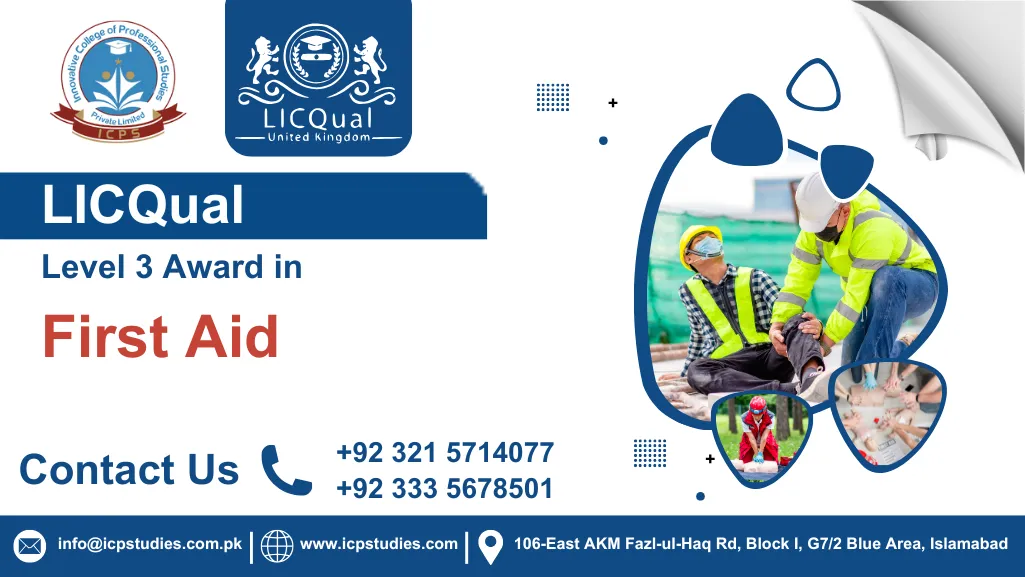Welcome to the LICQual Level 3 Award in First Aid course! This advanced qualification is designed for individuals who want to develop a deeper understanding of first aid practices and become highly skilled in responding to medical emergencies. Whether you’re a workplace first aider, a healthcare professional, or someone looking to enhance your emergency care skills, LICQual Level 3 Award in First Aid offers the knowledge and practical techniques needed to handle complex situations effectively.
The LICQual Level 3 Award in First Aid equips you with the skills to manage a wide variety of emergencies, including severe trauma, medical conditions, and life-threatening injuries. LICQual Level 3 Award in First Aid offers more in-depth training than basic first aid certifications, making it ideal for those seeking to take on additional responsibilities in their workplace or community.
The LICQual Level 3 Award in First Aid covers a range of vital first aid topics, providing learners with both theoretical knowledge and practical skills. The LICQual Level 3 Award in First Aid includes advanced techniques for dealing with conditions such as heart attacks, strokes, severe bleeding, and respiratory emergencies. LICQual Level 3 Award in First Aid also covers how to manage head injuries, spinal injuries, and fractures, ensuring you are well-prepared for a wide range of critical situations.
All About LICQual Level 3 Award in First Aid
Course Overview
The LICQual Level 3 Award in First Aid is a comprehensive qualification designed to provide learners with the essential knowledge and practical skills needed to respond effectively to accidents, injuries, and medical emergencies. This course goes beyond basic first aid, offering advanced techniques and a deeper understanding of emergency care.
It is ideal for individuals working in high-risk environments, employers responsible for workplace safety, and anyone who wants to be fully prepared to save lives in critical situations. The program focuses on practical, hands-on training, enabling learners to confidently manage incidents until professional medical help arrives.
The qualification aligns with international first aid standards and emphasizes real-life scenario-based learning, ensuring participants are competent, confident, and ready to act when emergencies occur.
Study Units
- Principles of Basic Life Support (BLS)
- Performing CPR on Adults and Children
- Recognizing and Managing Choking in Adults and Children
- Using an Automated External Defibrillator (AED)
- Managing Unconscious Casualties
- Basic First Aid and Scene Safety
To enroll in this qualification, learners should meet the following requirements:
- Age Requirement: Minimum 16 years old at the time of registration.
- Educational Requirement: Basic literacy and numeracy skills (ability to read, write, and communicate in the language of instruction).
- Health & Fitness: Learners must be physically able to carry out practical first aid tasks such as CPR, recovery position, and casualty handling.
- Prior Knowledge: No previous medical or first aid qualification is required. However, having a Level 2 First Aid / BLS certificate is beneficial but not mandatory.
- Target Groups: Open to individuals from all professions, particularly those in workplaces, schools, healthcare, community services, security, and high-risk industries.
This qualification is designed for individuals who want to gain the skills and confidence to provide immediate and effective first aid in emergencies. It is especially suitable for:
- Workplace First Aiders – employees nominated to take responsibility for health and safety in offices, factories, warehouses, or construction sites.
- Healthcare Support Staff – nursing assistants, caregivers, and community health workers seeking formal certification.
- Teachers & Educators – school, college, and childcare staff responsible for the safety of children and students.
- Security, Police & Armed Forces Personnel – professionals who may encounter emergencies in the line of duty.
- Rescue & Safety Teams – fire wardens, disaster response, and humanitarian workers.
- General Public & Volunteers – anyone who wants to be prepared to act confidently during medical emergencies at home, work, or in the community.
Learning Outcomes
By the end of this qualification, learners will be able to:
- Understand the roles, responsibilities, and legal requirements of a first aider.
- Conduct a primary and secondary survey to assess casualties effectively.
- Apply Basic Life Support (BLS), including CPR for adults, children, and infants.
- Safely use an Automated External Defibrillator (AED) during cardiac emergencies.
- Manage casualties who are unconscious, choking, bleeding, or in shock.
- Provide first aid for burns, fractures, sprains, and head or spinal injuries.
- Respond to medical emergencies such as seizures, asthma, heart attack, stroke, diabetic episodes, and allergic reactions.
- Administer first aid for environmental conditions like heat stroke, hypothermia, and poisoning.
- Demonstrate safe methods of casualty handling, movement, and evacuation.
- Communicate clearly and effectively with emergency services, ensuring accurate reporting and documentation.
FAQs LICQual Level 3 Award in First Aid

